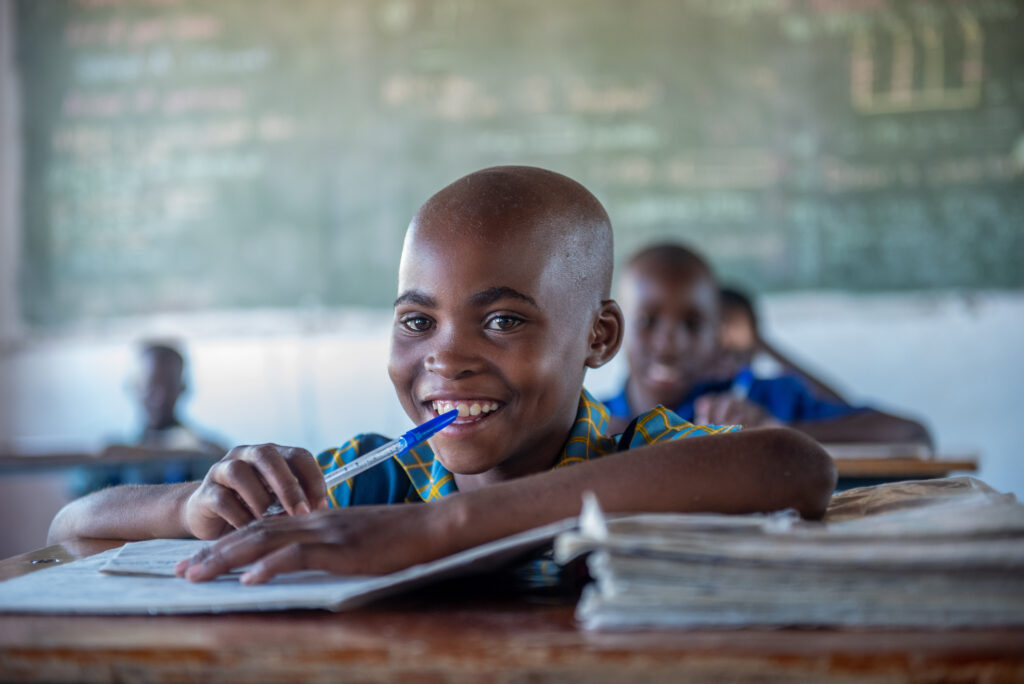Landmark procurement push expected to lower costs, stimulate donor funding, and engage with private suppliers.
GENEVA, May 22 – Botswana is quietly leading a digital revolution in Africa – connecting hundreds of schools, reshaping public markets, and providing new opportunities for its youth to pick up the necessary skills that will allow them to thrive in a digital economy.
Bold government leadership means Botswana is connecting its schools to the internet at a faster rate than many other countries and finding new ways to leverage these connections.
UNICEF played an early role in this success when it partnered with SmartBots, Botswana’s flagship digital transformation project, reshaping the procurement and delivery of access to the internet.
The southern African country has hardly looked back. Just a few years ago, connecting a single school in Botswana could cost BWP 279 (US$ 21) to BWP 15 (US$ 1.5) per Mbps. Today, those same schools receive 100 Mbps for about USD 150—a 93% reduction in monthly costs.
“SmartBots isn’t just about connecting schools—it’s about creating a more efficient, inclusive digital economy,” says Kudzani Briggs, who leads Giga’s operations in Botswana.
At the heart of this work is a simple idea: when young people can access the internet, they gain the skills to participate in, and help shape the digital world.
Collaboration began with the connection of six pilot schools, then 100 more in remote and underserved areas. This effort yielded critical lessons and helped the government hit a major milestone: 700 schools and 400,000 students benefiting from reliable internet access at the end of 2024.
Giga has also supported the Government of Botswana to map schools and adopt a market-shaping approach to procurement. UNICEF provided the data, tools, and benchmarks, enabling Botswana to consolidate demand across ministries, coordinate procurement, and create a more competitive market for connectivity.
Botswana isn’t stopping at schools. With more than 700 already connected, the government is now extending the same model to health centres and community facilities. By sharing infrastructure across sectors, this integrated approach improves affordability and amplifies the impact of public investment.
That leadership is especially impressive given Botswana’s structural challenges. With just 4.5 people per square kilometre, it is the least densely populated country in Giga’s nine-country market assessment. Still, the government has committed to connecting every village with more than 500 residents,and has financed 100% of infrastructure deployment through its national broadband provider, BoFiNet.
Three key innovations made this possible:
- Aggregated demand increased competition and drove down prices.
- Technology-neutral tenders enabled satellite, wireless, and fibre providers to compete on equal terms.
- Real-time mapping and monitoring, developed with Giga, brought transparency and built supplier confidence.
Looking ahead, Botswana is now tackling a new challenge: keeping connectivity affordable and sustainable, especially in rural regions. International bandwidth remains expensive, and operating costs (OPEX) such as monthly service fees and maintenance, continue to strain budgets.
Although over 90% of the population is within reach of mobile broadband, only 49% are active users, which points to fundamental gaps in affordability, device ownership, and perceived value. However, progress continues. In early 2024, Starlink launched services in Botswana, offering high-speed satellite internet at approximately USD 48 per month for 150 Mbps. While not a silver bullet, the arrival of a new provider—particularly one targeting remote areas—illustrates how increased market competition can put downward pressure on prices and expand access. As more players enter the sector, this kind of disruption has the potential to benefit all technologies and service models, reinforcing affordability as a realistic goal for national education systems.
Botswana also benefits from high digital literacy. Ranked as the fourth most innovative economy in Africa, the country’s youth and workforce are well-positioned to capitalise on expanded internet access and digital learning opportunities.
Still, challenges remain. Remote schools will require innovative financing, and long-term success will depend on continued public-private collaboration. But the foundation is strong—and the direction is clear.
“Botswana has shown that this isn’t just about getting schools online,” says Briggs. “It’s about shaping a market that works for governments, businesses, and, most importantly,young people.”
As African countries race to connect half a million schools by 2030, Botswana offers more than a success story. It offers a scalable model,and proof that with the right leadership, and smart procurement, transformative change is within reach.
As one of the world’s largest buyers of goods and services for children—procuring over USD 5.2 billion across 162 countries in 2023—UNICEF brings a powerful advantage to the table. Through Giga, this procurement expertise is applied to connectivity, helping governments pool demand, standardize tenders, and open the market to a wider range of providers.
***
Sources:
¹https://www.unicef.org/botswana/media/1161/file/Case%20Study%20Giga%20%20Learning%20Passport%20%20Botswana.pdf.pdf
²World Bank Group: Botswana – Digital Economy Diagnostic: https://documents.worldbank.org/en/publication/documents-reports/documentdetail/099100007222230376
²World Bank Group: Botswana – Digital Economy Diagnostic: https://documents.worldbank.org/en/publication/documents-reports/documentdetail/099100007222230376
3 Giga Market Assessment: https://s41713.pcdn.co/wp-content/uploads/2024/04/Giga_-Africa-market-assessment_Final-Report.pdf
4 UNECA, WIPO: https://uneca.org/stories/botswana-establishes-smartbots-lab-to-drive-innovation-and-digital-transformation

